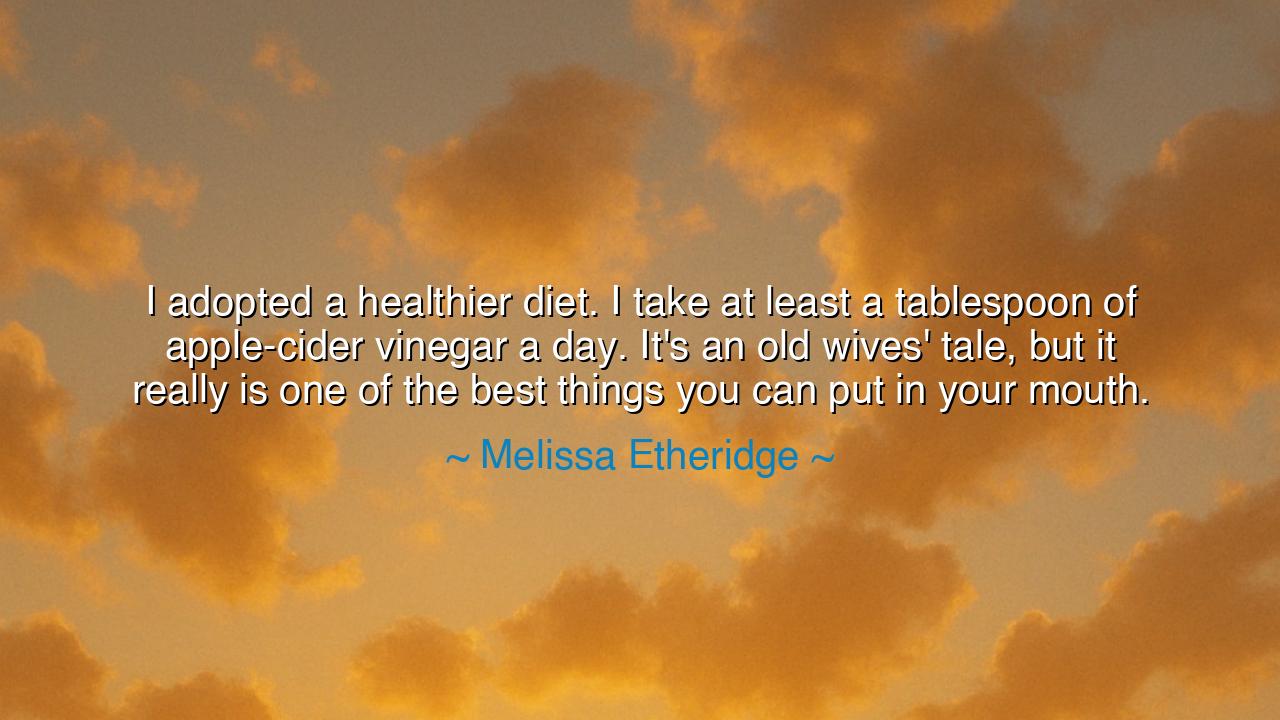
I adopted a healthier diet. I take at least a tablespoon of
I adopted a healthier diet. I take at least a tablespoon of apple-cider vinegar a day. It's an old wives' tale, but it really is one of the best things you can put in your mouth.






"I adopted a healthier diet. I take at least a tablespoon of apple-cider vinegar a day. It's an old wives' tale, but it really is one of the best things you can put in your mouth." These words, spoken by Melissa Etheridge, are a testament to the enduring power of natural remedies, the wisdom of the ages, and the humble but potent forces that have been passed down through generations. In her simple acknowledgment of apple-cider vinegar, Etheridge embraces the timeless wisdom that sometimes the most effective solutions are found in tradition, in the practices that have weathered the tests of time and have been handed down by those who came before us.
Apple-cider vinegar, an elixir long revered in the lore of many cultures, is an embodiment of the ancient knowledge of healing. Though it may be labeled as an "old wives' tale" in modern times, its origins trace back to the early civilizations—Babylonians, Egyptians, and Greeks—who recognized its ability to cleanse the body, support digestion, and even act as a preservative. In the stories of ancient healers and wise women, this humble vinegar was often seen as a tool of great power, used to purify the body and restore balance. Etheridge, in her embrace of this age-old remedy, reflects a deeper truth: wisdom does not always come in the form of grandeur or modern science, but in the quiet, simple knowledge passed down through the generations.
In the ancient world, Hippocrates, the father of medicine, spoke of the importance of diet and nutrition in maintaining health. He famously said, "Let food be thy medicine, and let medicine be thy food." This profound teaching resonates with the essence of Etheridge’s words, for it calls us to look not only to the elaborate cures and potions of modernity but to the simple, natural elements that have supported the health of humanity for centuries. Like apple-cider vinegar, which can be found in the most modest of kitchens, many of the remedies we seek for our ailments may lie not in the complex formulas of science, but in the humble, natural gifts that nature provides.
Consider the story of the ancient Greeks, who, under the teachings of Hippocrates and later Galen, believed in the healing properties of herbs, oils, and vinegars. These natural substances were viewed not as mere food or seasoning, but as tools of wellness. The simple act of consuming something as basic as vinegar, when used with knowledge and purpose, could be transformative. Similarly, in traditional Chinese medicine, practitioners have long understood the importance of balance in the body, using natural elements such as herbs and vinegars to restore health. The wisdom of these cultures teaches us that healing is not always a grand act, but a return to the natural state of balance and harmony.
Etheridge’s daily ritual of consuming apple-cider vinegar serves as a reminder of the importance of consistency in nurturing our bodies. The practice is as much about a mindful connection to our well-being as it is about the physical benefits. It is an acknowledgment that health is a practice, not a destination, and that small, simple acts—such as a daily dose of vinegar—can serve as foundational rituals that help sustain us through life’s challenges. In this way, Etheridge’s words inspire us to embrace the simple acts of care that often hold the greatest transformative power, guiding us toward longevity and vitality.
Moreover, apple-cider vinegar—though celebrated today for its potential to aid digestion, support the immune system, and detoxify the body—also represents a shift in how we think about wellness. It challenges the prevailing notion that healing must come from the latest pharmaceutical breakthrough or scientific discovery. Instead, it invites us to return to the ancient principles that honored nature’s wisdom, showing us that true health is found not in the complexity of modern treatments, but in the humble, often overlooked, remedies that have stood the test of time.
So, what lesson can we take from Etheridge's embrace of this age-old practice? It is a call to trust in simplicity, to honor tradition, and to understand that health is a continuous journey—a series of small, mindful actions that build over time. Whether it is a simple habit like taking apple-cider vinegar or a broader commitment to a nourishing diet, it is in the rituals of care that we cultivate lasting vitality. Like the ancients who understood the power of the natural world, we must seek out the practices that nurture our bodies, trusting that the wisdom of the past can guide us toward a future of balance and well-being.
Thus, let us adopt the wisdom of Melissa Etheridge, who, like the healers and philosophers of old, reminds us that true health is often found not in complexity, but in simplicity. Let us return to the earth’s gifts, to the remedies that have been with us since time immemorial, and let us honor our bodies with the same reverence that they deserve. By weaving these simple, yet profound practices into our daily lives, we forge a path toward a deeper connection with our health and the world around us.






AAdministratorAdministrator
Welcome, honored guests. Please leave a comment, we will respond soon